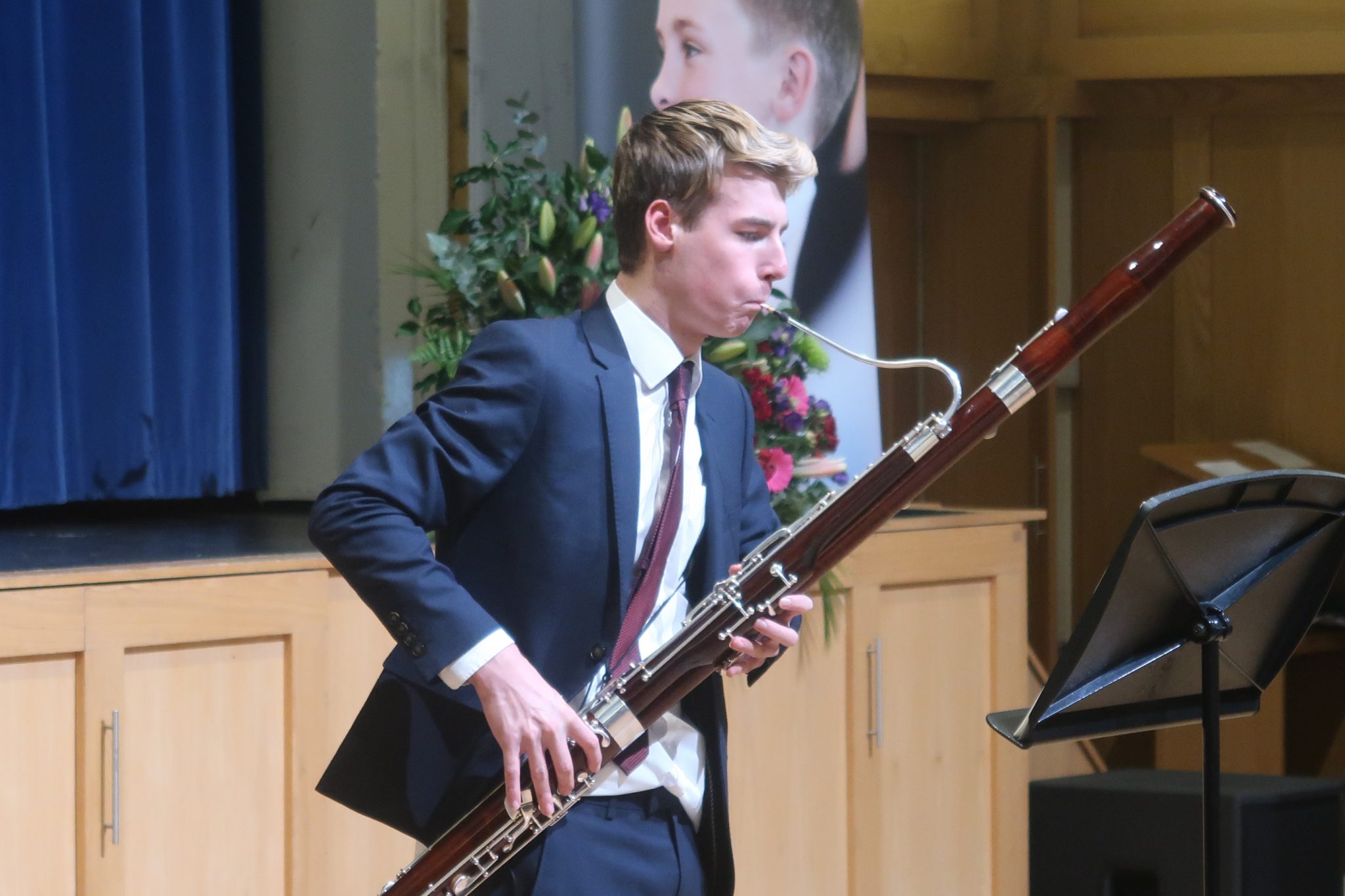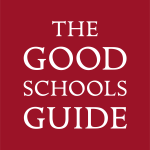The Royal Academy of Music has been training talented musicians to the highest professional standards since its foundation in 1822, making it the oldest conservatoire in the UK. Over the summer, we caught up with OE Josh Blows, who is currently studying for a Bachelor of Music degree, and Deputy Head of School Sam Stocks, who is a member of the Junior Royal Academy of Arts, about their involvement with the Academy.
Josh Blows (OE2012-17 and Head Boy 2016-2017)
I am very lucky to have a musical family, so music has always been a part of my upbringing, but for a long time I found classical music very boring and much preferred rugby. I first started learning the violin when I was four but that was a big mistake for me and everyone else in my household! When I was 12, I discovered the trombone and that is when things really started to change for me. I got very lucky with inspiring teachers and when I was 15, I was in the Verbier Festival Junior orchestra and it all took off from there.
I was accepted into the JRAM when I was at Emanuel. Whilst it is a huge commitment and certainly impacts your weekend social life, it was critical in furthering my musical education and providing performance opportunities that ultimately led to me applying to study at undergraduate level.
I applied for three music colleges and RAM was certainly my top choice, so to receive an offer was a fantastic moment but also a huge sense of relief. Doing a different type of university application to UCAS was a big commitment and quite stressful, especially when my peers were getting offers at various universities. I was lucky to have teachers like Sarah Potts to advise me through the process.
I am doing a four-year Bachelor of Music degree that is principally focused on performance and studying the trombone. In the last three years I have had to undertake various modules in history of music, aural skills, analytical skills and conducting on top of the performance side – all of which require very different skill sets. One of the main attractions of RAM is it is part of the University of London which in itself offers a myriad of opportunities and connections.
At RAM, I enjoy being consistently surrounded by some of the best young musicians in the world. My playing has perhaps improved the most, simply by listening to my peers playing, and not just on the trombone. It creates an environment that, although competitive, makes me motivated and want to improve and work harder at what I love doing. RAM has certainly taught me how to thrive under pressure, which I now find an invaluable skill.
If you have a love for music and a desire to really push yourself as a musician, RAM can be the most inspiring place to be. It’s really important to remember that going to RAM doesn’t mean you have to be a musician either. It’s a great opportunity to do a degree that encourages both discipline and creativity which can be applied to all aspects of life.
I think I probably spent about 80% of my time in the Music department whilst I was at Emanuel. The sheer number of musical groups going on during lunchtimes and assemblies was really amazing and it kept me very busy. As a result, it is certainly the aspect of Emanuel I miss the most; Sarah Potts, Nick House and Simon Gregory did a fantastic job to make it such comfortable and creative place to be.
My proudest moments at Emanuel involve being in the choir, which was of an amazing calibre, and the opportunities that it led to such as singing in St Paul’s Cathedral and the amazing choir tours. Singing in Southwark Cathedral was particularly special as my grandfather had been a Canon there. These are unforgettable memories.
Nerves can be really difficult to get control of when it comes to performance. It can be a very personal process and is different for everyone. For me there are multiple ways to help my nerves: in advance this can be achieved from hours in a practice room going over all the little details to the point where I know it can’t go wrong but just before I walk on stage it can also be good to focus on breathing and forget about the minutiae of the music itself. But it is also about learning how to use nerves to your advantage and channeling them as adrenaline which ultimately leads to a more exciting performance.
Lockdown has had a devastating effect on the arts, including music, and certainly jeopardizes the future careers we have envisaged. Personally, I have found the lack of one-to-one contact with my professors, along with the inability to rehearse with my peers, very difficult; sadly, audio over Zoom will never quite do justice to anyone’s playing. My lessons have been done through sending recordings which my professors listen to and offer feedback and analysis on, but this has its limitations. It can also be difficult to find motivation outside of the music college environment, particularly when there are no performances to work towards. Hopefully this situation has drawn attention to how much we rely on the arts in general to keep us sane!
I would really love to study abroad for a few years in Europe when I graduate. There are great opportunities for classical musicians in Germany and Scandinavia, which can offer a lot more economic security than being a musician in London. There are also incredible players and different musical and cultural approaches to music to learn from.
In my downtime I try to avoid listening to the sort of music I am practicing and playing every day. Having said that, as a trombone player I will take any opportunity to play and listen to a big 19th century German symphony, which is very hard to beat!

Sam Stocks (Deputy Head of School)
I became interested in music at a very young age. I had my first piano lessons in Year 2 and did Grade 1, then moved on to singing lessons. One morning during a piano lesson, I heard this fantastic noise coming from the room next door. It was my first introduction to the bassoon. My piano teacher took me in and introduced me to Tom Hardy, who has played with many of the UK’s leading orchestras and ensembles, and he became my first bassoon teacher. I continued with lessons and grades at Emanuel with Jackie Hayter, followed by auditioning and getting into the Royal Academy of Music (JRAM) for their Junior Programme with principle study Bassoon.
I was over the moon when I was offered a place at the Junior Royal Academy of Music. To be offered a place at an institution where some of the greatest musicians have studied, including Elton John (a personal role-model) was just fantastic. The quality of the teaching, the ensembles and more is just unbeatable and it was the natural progression from music at Emanuel for me.
I go to the Royal Academy of Music every Saturday and engage in various ensembles, such as Choir, Wind Quintet and Symphony Orchestra. I also attend a General Musicianship session once a week where we are learning about different styles of opera and have a bassoon lesson each week.
For me, the Symphony Orchestra is the best part of JRAM. The feeling of playing with a multitude of really talented musicians who are all extremely passionate about what they are doing is just magnificent. The standard is phenomenal; it never ceases to surprise me how dedicated and talented everyone is.
I would encourage keen musicians to apply for JRAM. It’s a big commitment, but you don’t need to worry about missing social commitments. I’ve made an amazing group of friends in just a year there and have been missing them very much over lockdown. The atmosphere at JRAM is dedicated and focused yet being a part of the academy is such a fun and enjoyable experience. The ability to walk into the magnificent building and explore its many corridors never fails to excite me.
At Emanuel, I play the bassoon, sing and play the piano so I have been involved in many performances including ensembles, groups, the band in the school musical and a lead in last year’s production of Oliver!. I won the Raeburn Cup in 2019 and it was such an honour to be recognised for my singing and commitment to the Emanuel Music department.
Coping with nerves before a performance is always difficult! I have found that anxiety decreases with experience of performing. The main things I do before bassoon or singing performances is drink lots and lots of water and take deep breaths to lower my heart rate a bit!
It is devastating that all live ensemble music making has come to a complete stop during lockdown. As a substitute, I have organised, produced and mixed three separate virtual choir/band video: You Will Be Found from the musical Dear Evan Hansen, This is Me from The Greatest Showman and Hallelujah by Leonard Cohen. I included people from Emanuel and JRAM for a range of voices and instruments. I have also begun working with my Church on virtual worship projects as we are now able to do some live singing with one other person. It has been fantastic to start singing again. I’ve recorded and mixed a new cover of me singing If I Can’t Love Her from Beauty and the Beast that will be released on all streaming services soon.
In terms of my favourite music to play, I adore Pierné’s Solo de Concert for bassoon and piano and I am putting together a segment with me performing it for a virtual concert at the Academy shortly.
In addition to music, I’ve been involved with Media Club for over two years now, presenting for Emanuel News and interviewing Emanuel alumni. I have also taught Film Making in the film studio as part of the school’s Primary Ambitions outreach programme, which was a very useful experience.














